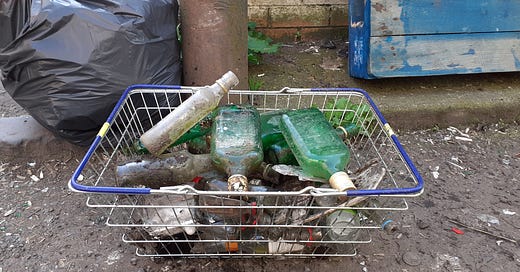Litter-pickers, mental health mountaineers and conquering the Munros of Scotland
Including: The Clydesider is hiring, shipping sector must go carbon free by 2050 and City of Edinburgh Council accused of "raiding the pockets of residents" + more inside
This week, we’ve got a mix of inspiring stories, exciting developments, and important discussions happening across Scotland.
We're thrilled to share the latest on Keep Scotland Beautiful’s annual spring clean, which kicked off on Friday, and encourage you to get involved in tackling the nation’s litter emergency.
In more personal news, we introduce Shahid Choudhary, the Glasgow-based printshop owner who has become the first Scottish Pakistani Muslim to conquer all 282 Munros in Scotland.
There’s also a lot of action in the world of local media, with updates from The Clydesider, The Bellman, and The Edinburgh Reporter, including a heated debate over a £320,000 graphic design contract in Edinburgh.
And don’t miss insights into the challenges facing local news providers, including barriers to investigative journalism and the role of public data in accessible media, with updates from both PINF and Neiman Lab and Journal of The British Academy..
scroll down to stay in the loop! 🗞️
Follow us on:
BlueSky & X: @scottishbeacon Instagram: @scottishbeacon Facebook: @scottishbeacon
Latest from our website
Keep Scotland Beautiful’s annual spring clean started on Friday
People across Scotland are being encouraged to sign up for a national challenge to address the country’s litter emergency…
Rural Growth Deal signed by Scot and UK governments
The Scottish and UK governments have signed a £70m growth deal for Argyll and Bute…
Meet Shahid Choudhary, a Glasgow-based printshop owner and trailblazing mountaineer
Shahid Choudhary, a printshop owner from Govanhill, Glasgow is the first Scottish Pakistani Muslim to complete all 282 Munros in Scotland…
More from our partners
The Clydesdier: Hiring a Community Media Lead to develop Clydesider TV and deliver community filmmaking training - closing date March 28
The Bellman: Stonehaven group helps people with dementia connect through art
The Edinburgh Reporter: Edinburgh Council is accused of “raiding the pockets of residents” after putting out a £320,000 contract for “glitzy” graphic design services
Forres Local: The Falconer Museum in Forres could be set for a new chapter as ambitious proposals to reopen the historic institution under independent governance
Glenkens News: The Galloway & Southern Ayrshire Biosphere Partnership has announced that it will be running its popular Biosphere Guide Training Course again
Greater Govanhill: SNP snatched-up two Labour seats in Glasgow last week following a by-election in the Southside Central and North East wards
Inverclyde Now: McGill’s plan growth across UK and beyond says Chairman
The Lochside Press: A new online initiative to raise awareness of community projects and find funding for them has been launched in Argyll and Bute
The Midlothian View: New 50 mile per hour speed limit is set to be trialled on four roads in the Borders from next month, as part of a drive to make them safer for bikers
Migrant Women Press: Diaspora Africa co-founders Chimee Adịọha and Amaka Obioji call for a shift in how their stories are told
The Orkney News: The Scottish Government’s Play Vision Statement and Action Plan for 2025 – 2030, has just been published
Shetland News: Shipping sector must go carbon free by 2050, UK Government says
Elsewhere in local news…
The local newspaper as “accidental social infrastructure”
Research published by Journal of The British Academy in February explores the role of local journalism, particularly legacy commercial newspapers, as an unexpected but crucial part of community infrastructure.
While local newspapers are often valued for their content, the new research suggests they also serve as "accidental social infrastructure." This means they help build social capital and foster social connections, even though that wasn't their original intent.
By examining interviews with people working with local newspaper archives, the paper shows that local journalism contributes to stronger, more connected communities by supporting social interaction and community engagement.
Wired’s un-paywalling of stories built on public data is a reminder of its role in the information ecosystem
According to Neiman Lab, Trump’s wholesale destruction of the information-generating sectors of the federal government will have implications that go far beyond .gov domains.
In a recent article, Neiman Lab discussed Wired's decision to remove paywalls from stories primarily based on public data, such as government research and records. This move highlights the importance of public information in journalism and its role in supporting democratic accountability.
By making these articles free to access, Wired emphasizes the public's right to access critical information, especially as government transparency declines. The piece also advocates for other media outlets to follow this example, arguing that media should prioritize public interest while balancing business needs.
What obstacles do local news providers face to doing journalism? PINF’s input into DCMS’s local media strategy
Late last year, Culture Secretary Lisa Nandy announced plans to develop a local media strategy. PINF have since gathered evidence on challenges providers face and summarised them in their blogpost.
PINF’s blog post discusses the obstacles local news providers face in conducting journalism, particularly in response to the UK Department for Digital, Culture, Media & Sport’s (DCMS) local media strategy.
It highlights several key challenges: limited resources prevent newsrooms from tackling in-depth investigative stories, while slow responses from press officers and restricted access to public meetings hinder timely and effective reporting.
Additionally, local government websites are often difficult to navigate, making it harder to obtain crucial information. Small newsrooms also struggle with gaining access to press credentials, which limits their ability to cover important events.
Finally, rising costs for services like land registry searches make investigative journalism even more expensive. The post calls for reforms to address these issues and ensure that local journalism remains viable and impactful.





